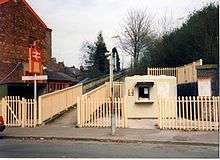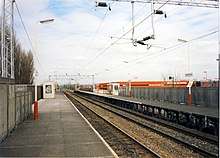Mauldeth Road railway station
Mauldeth Road railway station (known as Mauldeth Road for Withington until 1974) is a suburban railway station serving the Ladybarn area of Manchester, England. It is the last station before Manchester Piccadilly on the Styal Line and was electrified in 1959.
| Mauldeth Road | |
|---|---|
Departing Class 323 at Mauldeth Road railway station in 2013 | |
| Location | |
| Place | Ladybarn |
| Local authority | Manchester |
| Grid reference | SJ862931 |
| Operations | |
| Station code | MAU |
| Managed by | Northern Trains |
| Number of platforms | 2 |
| DfT category | D |
| Live arrivals/departures, station information and onward connections from National Rail Enquiries | |
| Annual rail passenger usage* | |
| 2014/15 | |
| 2015/16 | |
| 2016/17 | |
| 2017/18 | |
| 2018/19 | |
| Passenger Transport Executive | |
| PTE | Transport for Greater Manchester |
| History | |
| 1909 | Opened |
| 1959 | Electrified |
| 1974 | Renamed |
| 2007 | Refurbished |
| National Rail – UK railway stations | |
| |
The station sits on the Styal Line to Manchester Airport, one of the most congested lines on the national rail network.[1] Historically it has been served by a half-hourly stopping service to Manchester Airport/Crewe and Manchester Piccadilly; however, since May 2018, services operate on a 'skip-stop' basis at irregular intervals to increase capacity on the line. As a result, one of the half-hourly stopping services was replaced with a Northern Connect semi-fast service to Liverpool.
History

The station opened in 1909, south of Longsight (Slade Lane Junction), as Mauldeth Road for Withington. It was renamed Mauldeth Road on 6 May 1974 [2] and now serves the Manchester-Crewe (via Manchester Airport) rail route, used by Northern for stopping services to Manchester Airport. Its coal sidings closed in the 1960s, along with its original platform buildings on the up (southbound) side.
The remaining wooden ticket office, on the down platform, burned down on Bonfire Night in 1986; thereafter the ticket office was a small prefabricated unit at the bottom of the station approach.
It caters mainly for commuter traffic, being electrified at 25 kV AC overhead, and is used by EMU traffic. Some evening services are operated by TransPennine Express with DMUs.
2006 redevelopment

As part of a £12 million station modernisation programme on the Manchester Airport Line, re-building work on Mauldeth Road railway station commenced in autumn 2006.[3] Network Rail were able to keep the station operational for most of the time by demolishing the existing platforms in small parts and using temporary platforms. There was a temporary footbridge spanning the platforms while the pedestrians' access ramp to the northbound platform was out of use during renovation; the footbridge offered a vantage point for views over Manchester.[4] As part of the re-building work new steel platforms, modern waiting shelters, new lighting and access ramps were constructed with work completed by June 2007.[5]
Recent developments
Following extensive redevelopment of the station in 2006, passenger numbers doubled from approximately 148,000 to 323,000 in the five years between 2007 and 2012.[6]
The portakabin ticket office, used since the late 1980s, was closed and removed in April 2013. A new purpose-built ticket office, funded by Network Rail, was constructed in summer 2013 and opened in October 2013.[7]
In March 2017, the old rail bridge over Mauldeth Road, originally from when the line opened in 1909, had come to end of its life and was replaced with a new bridge.
2018 timetable recast
Historically, the station has been served by a half-hourly Northern service each way to Manchester Piccadilly and Crewe. In 1993, following the opening of the railway station at Manchester Airport, every other service terminated and commenced at Manchester Airport while another continued onto either Wilmslow, Alderley Edge or Crewe.
The new 2018 timetable was the most radical in decades and notable for its poor introduction, which was marked by many delays and cancellations. As part of the May 2018 timetable change, the Styal Line to the Airport now operates on a skip-stop basis to free up additional capacity for express trains. Consequently, Mauldeth Road station is still served by two services per hour but at more irregular intervals and not all services stop at the four other commuter stations on the Styal Line (Burnage, East Didsbury, Gatley and Heald Green), as has been the case historically.
Additionally, services were extended to Liverpool Lime Street which allowed for the service to utilise the two through platforms (13 and 14) at Piccadilly rather than terminating into a bay platform - which prevents the services from cutting across the 'throat' of the approach into Piccadilly and reducing capacity for trans-pennine services.
Facilities
The station has a manned ticket office on the ramp to Platform 1 (for trains to towards Manchester Piccadilly). There is also a ticket machine at the station situated adjacent to the ticket office. There is step-free access to both platforms. Next to Platform 2, there is a station car park.
Services
Historical
Since the opening of Manchester Airport railway station in 1993, the Monday to Saturday service pattern was 2 trains per hour to Manchester Piccadilly. 2 trains per hour operated in the opposite direction - one to Manchester Airport and the other continued onto Crewe until 17:53, then terminated at Wilmslow in the evening. Sunday services consisted of 1 train per hour to Manchester Airport, with one service every 2 hours continuing to Alderley Edge and 1 train an hour to Manchester Piccadilly.
Present
Since May 2018, the Monday to Saturday service pattern is as follows:
- 1 train per hour to Crewe via Manchester Airport - operated by a Class 319 or Class 323 (Class 331 from December 2019);
- 1 train per hour to Manchester Airport - operated by a pair of Class 150s or Class 156s (Class 195 from May 2019);
- 1 train per hour to Liverpool Lime Street via Manchester Piccadilly - operated by a Class 319 or Class 323 (Class 331 from December 2019);
- 1 train per hour to Liverpool Lime Street via Manchester Piccadilly and Warrington Central - operated by a pair of Class 150s or Class 156s (Class 195 from May 2019);
- 2 trains per day to Cleethorpes - operated by TransPennine Express with a Class 185;
- 3 trains in the morning to Blackpool North via Preston - operated by a Class 319 or Class 156 (Class 331 from December 2019).
Sunday services consist of:
References
- "Timetable recast: too much, too quickly". Railway Gazette. 4 June 2018. Retrieved 13 August 2018.
- Slater, J.N., ed. (July 1974). "Notes and News: Stations renamed by LMR". Railway Magazine. Vol. 120 no. 879. London: IPC Transport Press Ltd. p. 363. ISSN 0033-8923.
- "Good News for Passengers - Revamped East Didsbury Station Open on Time" (Press release). Network Rail. 13 September 2006. Archived from the original on 28 September 2007. Retrieved 25 October 2007.
- "Stunning views over Manchester from Mauldeth Rd station temporary footbridge". Retrieved 1 November 2007.
- "Construction in the UK Transport Industry" (PDF). Unite the Union. Archived from the original (PDF) on 5 February 2007. Retrieved 25 October 2007.
- "Estimates of station usage". Office for Rail and Road. Retrieved 2 December 2018.
- "Metrolink and Rail Networks - 1 November 2013" (PDF). Transport for Greater Manchester. 1 November 2013. Retrieved 2 December 2018.
- Table 85 National Rail timetable, December 2018
Further reading
- Mitchell, Vic; Smith, Keith (2014). Crewe to Manchester. Middleton Press. figs. 59-60. ISBN 9781908174574. OCLC 892047119.
External links
| Wikimedia Commons has media related to Mauldeth Road railway station. |
- Train times and station information for Mauldeth Road railway station from National Rail
| Preceding station | Following station | |||
|---|---|---|---|---|
| Burnage | TransPennine Express South TransPennine (Limited service) |
Manchester Piccadilly | ||
| Burnage | Northern Trains Crewe to Liverpool Lime Street via Chat Moss (Styal Line local stopping service) |
Manchester Piccadilly | ||
| Gatley or East Didsbury |
Northern Trains Manchester Airport to Liverpool Lime Street via Warrington Central (Semi-fast service) |
Manchester Piccadilly | ||
| Burnage | Northern Trains Manchester to Preston Line (Limited service) |
Manchester Piccadilly | ||
| Future Services | ||||
| Manchester Airport | Northern Connect Liverpool Lime Street - Manchester Airport |
Manchester Piccadilly | ||
| Burnage | Northern Connect Blackpool North - Manchester Airport |
Manchester Piccadilly | ||
| Gatley | Northern Connect Barrow-In-Furness/Windermere - Manchester Airport |
Manchester Piccadilly | ||
|}